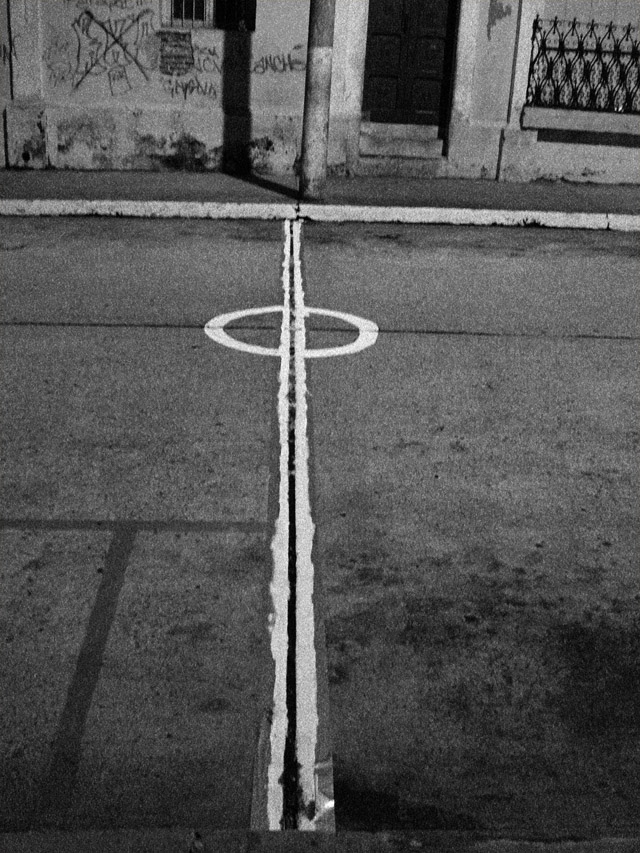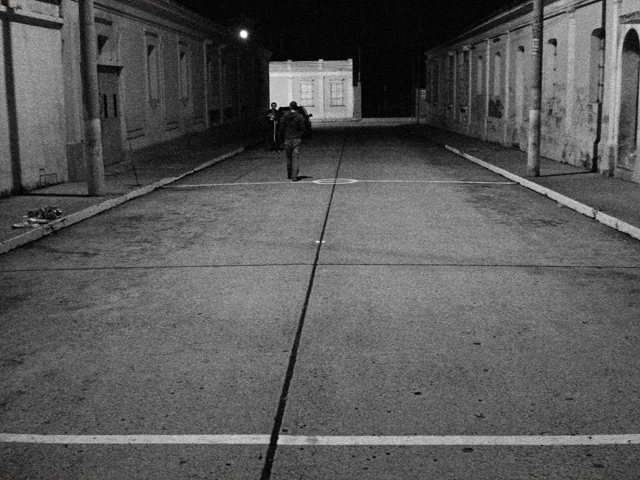Think Space
Autor/izvor: DAZ / Think Space 19/09/2013
Nastavljamo s uvodom u novi ciklus Think Space programa donoseći vam neke od najzanimljivijih radova s prošlogodišnjeg izdanja Call for Papers / Poziva na objavu stručnih i teorijskih radova u arhitekturi. Danas - rad Ethel Baraona Pohl i Cesara Reyes Najera, ovogodišnjih gostiju kustosa Think Space ciklusa, „Transcoding Situationism“
Ethel Baraona Pohl je arhitektica, spisateljica i bloggerica koja razvije svoju profesionalnu mrežu putem nekoliko platformi koje se bave projektima i teorijom. Među medijima za koje radi kao pridruženi urednik potrebno je istaknuti Domus, Quaderns i MAS Context. Kustos suradnik na Adhocracy | Istanbul Design Biennial.
César Reyes Nájera je arhitekt s PhD titulom iz područja bio-klimatskih konstruktivnih sistema i materijala. Njegov rad se bazira na termodinamičkom pristupu arhitekturi s fokusom na socijalne aspekte, a njegovo istraživanje se bavi razvojem i primjenom low-tech bio-materijala u arhitekturi.
Ethel i Cesar su suosnivači neovisne izdavačke kuće dpr-barcelona i ovogodišnji gosti kustosi novog Think Space ciklusa. Temu ciklusa MONEY/ NOVAC i prvi natječajni zadatak Territories/ Teritoriji predstavit će u Laubi, u utorak 24.rujna 2013. u 18h. U interdisciplinarnom razgovoru za okruglim stolom uz goste kustose Ethel Baraona Pohl i César Reyes Nájera (dpr-barcelona) sudjelovat će dr.sc. Mario Vrbančić (Filozofski Fakultet u Zadru), Željko Ivanković (časopis Banka) i Marko Dabrović (3LHD). Razgovor će moderirati dr.sc.Tomislav Pletenac (Filozofski fakultet u Zagrebu). Ovom prilikom pozivamo Vas na predstavljanje novog ciklusa programa Think Space, a više informacija uskoro.
U svom prošlogodišnjem radu za Think Space - Transcoding Situationism autori analiziraju situacionistički manifest iz današnje perspektive. S posuđenim konceptima od Marshalla McLuhana, Julia Cortázara, Georgesa Pereca i Comité invisible (Nevidljivog komiteta), jedne eksplozivne kombinacije, osvrću se na urgentnost primjenjivosti koncepata i ideja navedenih autora u današnje vrijeme u kojem poštivanje kapitalističkih smjernica dominira nad jednakošću te socijalnim kriterijima. Vođenje gradova na takav način ima velike reperkusije na urbane interakcije, čime se otvara prostor za djelovanje iznešu ostalog i protiv krize kao sredstva vladanja. Situacionisti doprinose korisnim atomiziranim jedinicama informacija koje se mogu transkodirati suvremenim građanima omogućujući serendipitetsko stvaranje veza za učvršćivanje urbanih mreža snova, želja i emocija.
U nastavku vam donosimo tekst u cijelosti.

This text is not ours... but is written by us all. It is a subversion with some updates of the Internationale Situationniste Manifesto [1960] plus minor additions borrowed from Marshall McLuhan, Julio Cortázar, Georges Perec and the Invisible Committee. Even though the resulting cocktail must appear explosive, most of their postulates seem urgent in current days when the management of our cities reveal the consequences of following capitalist guidelines more than equity, social and relational criteria. Such management has had its repercussion in the form, the representation and the human interactions within the city [1]. So, this is arena to take actions, we should realize that in the end the crisis is just a way of governing and itʼs up to us to legitimate it or not.
While transcoding implies any loose in the quality on the information due to the transfer between devices or supports, our intention is to generate communicating vessels from such Manifesto to the urban society we are interacting with. In this case, the fragmentary message characteristic of SI provides useful units of atomized information to transcode to contemporary citizens thus facilitating the occurrence of serendipitous connections to strengthen urban networks of dreams, desires, and emotions and on site procrastination.
Keywords:
Situationism, Urban, Evolutive, pro-am, Relational, Architecture.
"If you’re bored, you’re doing something wrong"
Richard Dawkins
The existing system cannot subdue the new human force that is increasing day by day alongside the irresistible development of technology and the dissatisfaction of consumerist imposed uses in our senseless social life.
Distraction in this society cannot be distributed amongst a range of variants, but only rejected en bloc with this very society. The idea of progress has to be suspended until the whole system recover and start pulsing rhythmically with social relations.
What are the organizational perspectives of life in a society which authentically "reorganizes production and distribution on the basis of the free and equal association of the prosumers"? Work would more and more be perceived as means for socialization of vital goods intended to strengthen social mesh instead of enhancing individualism. Thus liberated from all economic commitments, liberated from all the odious debts and responsibilities from the past, humankind will exude a new surplus value, incalculable in money because it would be impossible to reduce it to the measure of waged work. The guarantee of the liberty of each and of all is in the value of the game, of life freely constructed. The exercise of this collective ludic recreation is the framework of the only guaranteed equality with non-exploitation of man by man. The liberation of the game, its creative autonomy, its latent constructive conflict supersedes the ancient division between imposed work and passive leisure.
Under the existing dominant society, which produces the miserable pseudo-games of non-participation, a true civic and urban activity is necessarily. The emergence of the species ludens (humans playing interactions in the streets of the city) as if moving within Constantʼs New Baylon would leave behind the bourgeois metropolis and generate a megastructure of relations, affections and dissensions. Sometimes it might be classed as criminality. It might be semi-clandestine. Or it even might appears in the form of scandal. So what really is the situation? It's the realization of a better city, which more exactly is provoked by the human interactions not by increasing infrastructure. A step beyond individualism until reaching awareness of the collective realm:
From
Us
to
our family
our neighborhood
our education
our job
our government
our city
our regions
our planet...
the planet and us within the planet
Within this scenario every agent formerly known as architect will become a hacker, i.e., inseparably a producer-consumer of total city creation, which will help the rapid issolution of the linear criteria of expertise. To address such activity it won’t be necessary to go to Academia... at least in the way we are used to do. Everyone will be a designer [from domestic to urban realm] so to interact, with a multidimensional connection of tendencies, experiences, or radically different "schools" — not successively, but simultaneously.
Henceforth, we are attending to an autonomous organization of the prosumers of the new culture, aside from the political and ideological organizations which currently exist, as we all together can dispute institutions’ capacity to organize anything other than the management of that which already exists.
But institutions cannot prevent what they are not able to imagine. From the moment our collective organization goes beyond the initial experimental stage and become aware of its critical mass, its most urgent objective should be the seizure of the cities. From there, connected at a world level, subvert the bureaucratization of cities management now expressing the deep inter-relationship of systems engaged in the conservation and the reproduction of the same obsolete model (even disguised with techno-smart and environmentally friendly discourse).

The riposte of the revolutionary citizens to these old conditions must be a new type of action. By means of autonomous communes that have been trained in local management of available resources and used to exchange experiences in open source platforms linked to other communities; the next step would be a putsch to the other pillar of the system: the financial framework currently favoring predatory tactics based in speculation and inequity relations between corporations and citizens and also between inhabitants of different regions while leaning their “wellness state” in the spoliation of other regions’ resources. As such financial system is completely destitute of any sensible usage outside our subversive perspective; we find our seizure of this apparatus justified before our contemporaries. And we will have it.
We are resolved to take over financial system, at least in its world-manipulating form, and in contrary favoring the formation of local trade and exchange networks. Given the financial collapses of the beginning of the XXI century, this would be one of the works which would prove most significant in the clarification of a long series of demands and actions. This financial coup d'etat would led to the suppression of the surplus layer of politics interested more in meet the commitments with private corporations and speculative financial actors rather the service of citizens.
What would be the main characteristics of the new culture and how would it compare with essential urbanity?
● Against the spectacle of individual progress, the realized situationist urbanity introduces the recognition of “the other” and its differences as essential step towards collaboration.
● Against preserved education, it is posed learning through direct experience with relational civic interactions, conflict management and “doing with others” strategies.
● Against particularized design, it will be a global practice with a bearing, each moment, on all the available elements. Naturally this would tend to collective production which would be without doubt anonymous (the claim of exclusive authorship would reveal suspicious and works will no longer be stocked as commodities but as means to reach collective goals). The minimum proposals of these experiences will be a revolution in behavior and a dynamic unitary urbanism capable of extension to the entire planet, and may become the key to access to all parallel universes created by a new conscious observation of all micro-ordinary events of the city.
● Against unilateral art, situationist culture will be an art of dialogue, an art of interaction, an art of conflict as enabling force. The enclosed era of primitivism and isolated design solutions must be superseded by complete communication and open peer to peer tools to reach dynamic equilibrium between opposites in a given urban system.
At micro-ordinary level, everyone will become a coder generating the conditions for its playful existence to insert and work within the urban system of interactions. It will happen that when opening the door and going where the street begins, it wonʼt appear the already known houses aligned in the moulded sidewalk, but a living forest where every moment “can be thrown like a magnolia and where the faces
will born when looking at them".[2] This violent emotive possession of the streets will provide exciting treasures for those drifters taking the challenge to explore alien quarters and neighbors.[3]
We have just move inside what will historically be the evolutive urban dimension. The role of amateurprofessional —of adhocrat— is again a specialization up to the point of social and mental interaction, when everyone becomes a node in the sense that the new system will remain in the strength of its connections. This task will be slowly filtering into to the society without a permanent division of labour, thus generating activities for which we haven’t invented the names yet.
To those who don't understand us properly, we say with an irreducible will: “We await the turning point which is the inevitable liquidation of the world of economic progress, in all its fictional forms. Such are our goals, and these will be the future goals of urbanity"
“It is the business of the future to be dangerous”
A.N. Whitehead
[1] Lara Schrijver. Radical Games. Popping th Bubble of 1960sʼ Architecture. NAI Publishers. Rotterdam 2009.
[2] Julio Cortázar. Historia de Cronopios y Famas. Afaguara. Buenos Aires, Argentina. 1965
[3] Simon Sadler. The Situationist City. The MIT Press. Cambridge, Massachusetts 1998.
Richard Dawkins
will born when looking at them
 Društvo
Društvo Društvo
Društvo